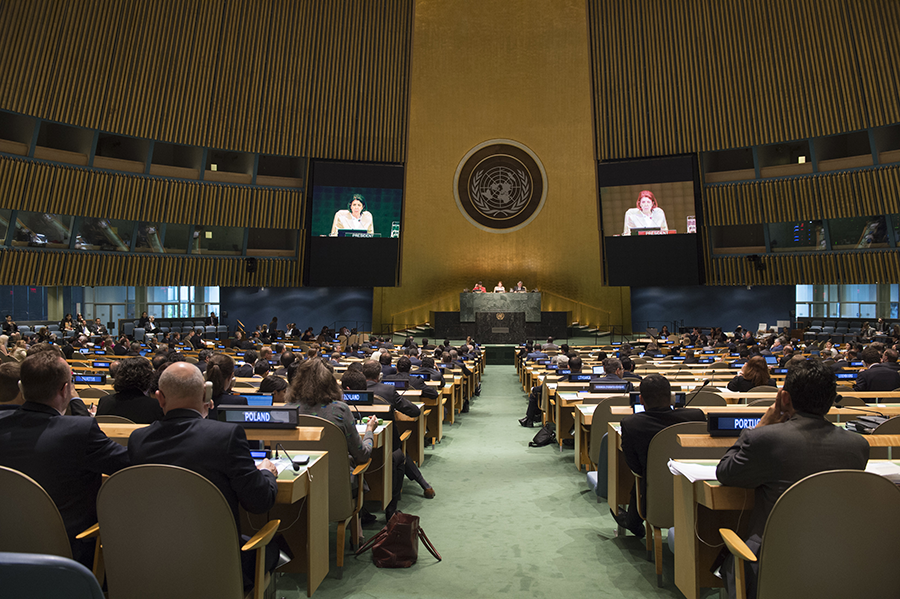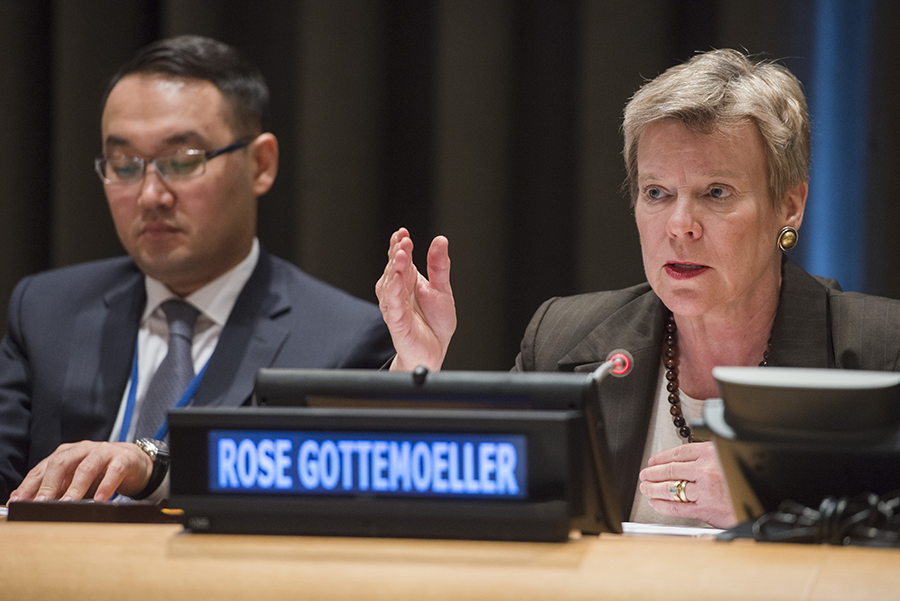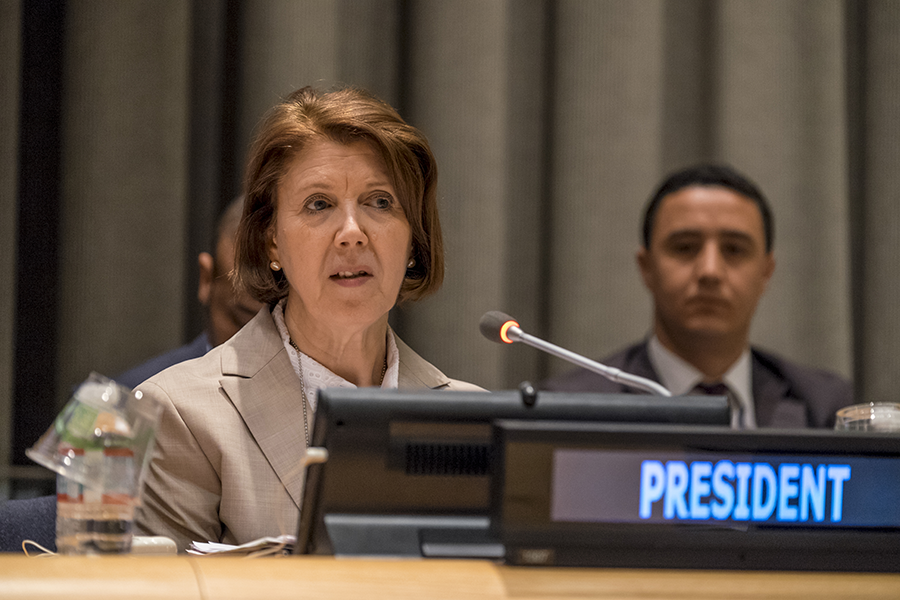"No one can solve this problem alone, but together we can change things for the better."
Learning From the 2015 NPT Review Conference
May 2020
By Thomas Countryman
As the 10th review conference for the nuclear Nonproliferation Treaty (NPT) approaches, the issue of establishing a zone free of weapons of mass destruction (WMD) in the Middle East continues to loom large, as it has for more than 25 years. The treaty’s 1995 review and extension conference adopted a resolution calling for such a zone, but no real progress has been made toward the goal, and the topic remains contentious. The issue prevented the 2015 review conference from reaching a final agreement, and that experience offers lessons for this year’s meeting.
 As the U.S. delegation entered the 2015 review conference, it anticipated the likelihood that the Middle Eastern zone issue would be the crucial subject for the final days of negotiations. The delegation believed that, despite lack of progress in arms control since conclusion of the 2010 New Strategic Arms Reduction Treaty (New START), the review conference could succeed in producing a consensus final document that would strengthen the NPT, provide impetus to the process of regular meetings of the five permanent members of UN Security Council, and, ideally, rejuvenate U.S.-Russian discussion of security issues.
As the U.S. delegation entered the 2015 review conference, it anticipated the likelihood that the Middle Eastern zone issue would be the crucial subject for the final days of negotiations. The delegation believed that, despite lack of progress in arms control since conclusion of the 2010 New Strategic Arms Reduction Treaty (New START), the review conference could succeed in producing a consensus final document that would strengthen the NPT, provide impetus to the process of regular meetings of the five permanent members of UN Security Council, and, ideally, rejuvenate U.S.-Russian discussion of security issues.
The United States recognized that this could well require it to compromise with Egypt, which represented the Arab League and Non-Aligned Movement (NAM), on the portion of a final document related to the Middle Eastern zone. Russia, the United Kingdom, and the United States had indisputably not succeeded in their commitment, made at the 2010 review conference, to convene an initial conference of a process leading to the zone. After the absence of consensus on an agenda for the conference caused the conveners to miss the target of the end of 2012, they convoked senior Arab and Israeli diplomats in a series of meetings in Glion, Switzerland, in 2013 specifically to seek a compromise on an agenda. Because all sides had shown some degree of flexibility at those meetings, the Obama administration tried to consider alternative approaches to get the process restarted, including a more direct role for the UN secretary-general. The U.S. readiness to consider a compromise also reflected its genuine desire to close the review conference successfully with a consensus document.
Opening on April 27, the prospects for the 2015 review conference advancing the zone were not promising. The Egyptian delegation met the Israeli observer delegation on the second day of the review conference, the only occasion of which I am aware when the countries’ experts directly discussed the zone bilaterally. Egypt, however, gave no indication it wanted to find language that Israel and the United States would be able to accept. At the time, several heads of Arab national delegations objected to the hard-line Egyptian approach, within private Arab discussions and directly with the U.S. delegation. These officials were promptly put back in line as the Egyptian delegation went over their heads to their foreign ministers. The Egyptian-Arab approach essentially ignored the agreed procedure for writing language on this issue in Subsidiary Body 2, a group that dealt with regional issues of nonproliferation, and whose Spanish chairman, in accordance with the usual division of labor at a review conference, was working to develop a text to recommend to the conference president. The U.S. delegation knew that Egypt was working with a small group of delegations (some nonaligned states, and Russia) to develop their own text.
 In anticipation of the need to compromise with Egypt, the White House recalled how negatively Israeli Prime Minister Benjamin Netanyahu had reacted to the Egyptian-U.S. compromise at the end of the 2010 review conference, despite the U.S. delegation having kept Israeli officials closely informed of that negotiation. The White House decided, as the review conference entered its final week in May, to dispatch me to Jerusalem to ensure that the Israeli government could not claim again to be surprised and, if necessary, for me to receive directly Israeli criticism of the eventual compromise. Notably, in May 2015, conclusion of nuclear negotiations with Iran, which were successfully reached just two months later, was a far higher priority than the review conference for U.S. leadership.
In anticipation of the need to compromise with Egypt, the White House recalled how negatively Israeli Prime Minister Benjamin Netanyahu had reacted to the Egyptian-U.S. compromise at the end of the 2010 review conference, despite the U.S. delegation having kept Israeli officials closely informed of that negotiation. The White House decided, as the review conference entered its final week in May, to dispatch me to Jerusalem to ensure that the Israeli government could not claim again to be surprised and, if necessary, for me to receive directly Israeli criticism of the eventual compromise. Notably, in May 2015, conclusion of nuclear negotiations with Iran, which were successfully reached just two months later, was a far higher priority than the review conference for U.S. leadership.
In New York, the review conference working groups successfully developed sound compromises on text for the NPT’s three pillars: disarmament, nonproliferation, and peaceful uses of nuclear energy. This achievement was impressive because many had feared that it would not be possible to find compromise language on key topics such as making a positive reference to the humanitarian initiative on nuclear weapons. Overall, these compromises, on everything but the Middle Eastern zone, were strengthened by the fact that both nuclear-weapon states and non-nuclear-weapon states appeared willing to accept them as a consensus text, even though it did not fully reflect their primary concerns or meet their maximum demands. In other words, it was potentially a good compromise by all parties in the interest of preserving a consensus process.
So, as in 1995 and 2010, the success of the review conference came down to the final 24 hours and to small-group negotiations over language concerning the Middle Eastern zone. These talks on the review conference’s penultimate day primarily involved Egypt; the United States; review conference president Taous Feroukhi of Algeria, (who largely excluded the UK); and the Russian delegation. On a number of secondary points in the Egyptian text, the U.S. delegation, led by Undersecretary of State Rose Gottemoeller and Ambassador Adam Scheinman, and the Egyptian delegation were able to find compromises, including resorting to the authority of the UN secretary-general to get a process started. The U.S. delegation, however, was unable to accept an early deadline, proposed for March 2016, for holding an initial conference on the zone. Even more problematic was Egypt’s insistence on deleting from the mandate the key phrase that had made compromise possible in 2010, that the conference be held “on the basis of arrangements freely arrived at.” In the U.S. view, then and today, this phrase was necessary not only to make an initial conference acceptable to Israel, but also for the credibility of any process that followed an initial conference.
 Feroukhi ended the meeting shortly before 1:00 a.m. and asked that all sides be ready to resume talking later that morning. The U.S. delegation was therefore more than surprised when Feroukhi issued a “final draft text” just an hour later. Moreover, this text removed all the small compromises on secondary issues agreed by the United States and Egypt and simply reverted to the original Egyptian text, which could not be interpreted as a sign of good faith.
Feroukhi ended the meeting shortly before 1:00 a.m. and asked that all sides be ready to resume talking later that morning. The U.S. delegation was therefore more than surprised when Feroukhi issued a “final draft text” just an hour later. Moreover, this text removed all the small compromises on secondary issues agreed by the United States and Egypt and simply reverted to the original Egyptian text, which could not be interpreted as a sign of good faith.
A few hours later, as the final day of deliberations began, Feroukhi tried hard with the U.S. delegation to find either a language compromise without reinserting “freely arrived at” or a procedural solution, such as the United States registering its concern in the plenary or elsewhere in the review conference documents but not actually blocking consensus. The White House confirmed the delegation’s instructions to hold firm on the key phrase and on objecting to the 2016 deadline, even if this meant blocking consensus on an otherwise acceptable text, an instruction which the U.S. delegation relayed clearly to Feroukhi. The delegation also advised her that because a “final text” had been tabled without agreement by the United States, the most responsible thing would be for the president simply to announce to the plenary that there was no agreement on a final text.
As the final session of the review conference approached on Friday afternoon, the U.S. delegation briefly considered whether to sit back at first in order to see whether another delegation might block consensus, as there were many rumors that key NAM states were unhappy with what they considered weak language on the disarmament pillar. This was impractical due to Feroukhi’s procedures, which jumped over the first agenda item, “general debate,” to go directly to consideration of her draft text. Sitting back would also have been inconsistent with traditional U.S. leadership within the NPT process. In the end, the United States was joined by Canada, Czech Republic, and the UK in objecting to the language on the zone.
I was still back in Jerusalem at this time, and I suddenly found myself to be very popular among Israeli officials. I took some satisfaction that we had avoided creating another irritant in the always irritated relationship between the Obama White House and Netanyahu. Yet, I felt a stronger sense of disappointment that the United States had missed an opportunity of greater importance to the security of the planet, a chance to strengthen shared nonproliferation and arms control goals.
I hope to learn the explanations and motives of the other actors in the endgame. For example, I cannot say whether Feroukhi believed or was convinced by Egypt and perhaps Russia that the United States would not follow through on its declared readiness to block consensus over this single issue. As the representative of Algeria, Feroukhi may have felt an obligation to present the Arab-drafted language in a draft document to be issued under her name.
The decision to insist on its original text represented, for the Egyptian delegation, a gamble with no serious downside. If the United States could be pressured by other states into accepting the Egyptian version, it would have been a significant victory for Egyptian diplomacy. If not, it could be explained not as Egypt’s failure, but as the United States again defending Israel in opposition to the rest of the world.
It is more difficult to understand the Russian role. In 2011 and 2012, the efforts of Russia, the UK, and the United States to convene an initial conference had been in harmony much more than they had been in friction. After missing the original 2012 target, the three continued close consultation, even as differences in approach became more clear. After an initial meeting of the three in the first week of the 2015 review conference, however, the Russian delegation worked on its proposed compromise language only with the Egyptian delegation. Perhaps the continuing U.S.-Russian dispute over Ukraine contributed to this strategic decision, although Moscow and Washington were cooperating well in the nuclear negotiations with Iran. Without consulting the UK, the United States, or the Spanish chair, who ultimately produced a text that the United States probably could have accepted if the conference president had ever offered it, Russia produced a working paper that made an effort to bridge the inevitable gap between U.S. and Egyptian positions.
Moscow doubtlessly had and still has a genuine interest in moving ahead with the possibility of a WMD-free zone in the Middle East. I strongly suspect, however, that Russia saw in those final 24 hours of the review conference a win-win possibility for themselves.
Helping to bring a compromise text to conclusion could have been trumpeted, with justification, as a success of Russian diplomacy. If compromise on the zone issue were not possible, however, then it would serve Russia’s interests well to have the United States take the blame for blocking a consensus document to which Moscow had several strong objections, particularly within the disarmament pillar. I do not know what role the Russian delegation played in persuading Feroukhi to reverse herself and issue an uncompromising draft in the wee hours, but it stood with her and Egypt later in the morning in refusing any return to the “freely arrived at” language.
The United States can hope that the secretary-general’s successful convening of a November 2019 meeting to discuss the zone will serve to remove this issue from the long list of issues that may disrupt the review conference. If that is not the case, then I have one piece of advice for the 2020 review conference president: Start early!
Egypt, if it chooses to press the issue, will continue to see a tactical negotiating advantage in delaying discussion of zone-related text until nearly all other issues are decided. After all, this tactic has worked for them at past review conferences just as often as it has failed. If there is hope for a consensus outcome in 2020, and I still have such a hope, the other states should wish to see, and this year’s conference president should seek to require, that the United States and Egypt begin their negotiations at the very beginning of the review conference or even earlier.
Thomas Countryman is the chair of the Arms Control Association Board of Directors. He served 35 years in the U.S. Foreign Service, retiring in 2017 as acting undersecretary of state for arms control and international security. He participated on the U.S. delegation to the 2015 Nuclear Nonproliferation Treaty Review Conference.
